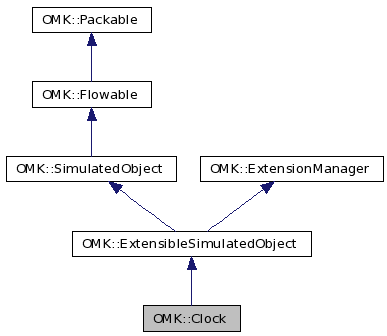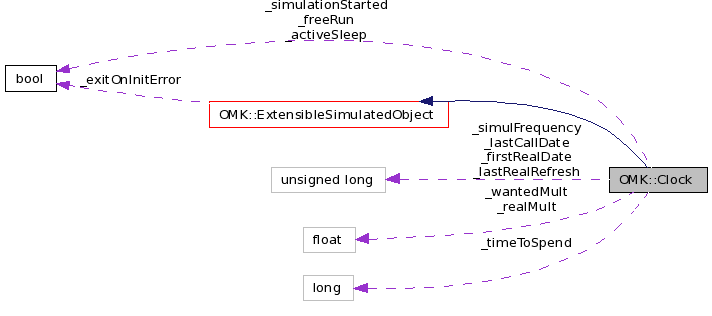
#include <OMKClock.h>
Inheritance diagram for OMK::Clock:


Public Member Functions | |
| DECLARE_OBJECT_FACTORY (Clock) | |
OpenMask inherited methods | |
| virtual void | init () |
| Init method inherited from SimulatedObject. | |
| virtual void | compute () |
| Compute method inherited from SimulatedObject. | |
| virtual bool | processEvent (Event *event) |
| process an event for this object. | |
class methods | |
| bool | isSleepActive () const |
| Get the clock active or passive sleep mode. | |
| void | setSleepActive (bool activeSleep) |
| Set the clock active sleep mode. | |
| bool | isFreeRunning () const |
| Get the clock in free run or controled mode. | |
| void | setFreeRunning (bool freeRun) |
| Set the clock active sleep mode. | |
| float | getRealMultiplier () const |
| Get the real clock ratio. | |
| float | getWantedMultiplier () const |
| Get the wanted clock ratio. | |
| void | setWantedMultiplier (float m) |
| Set the wanted clock ratio. | |
Protected Attributes | |
| unsigned long | _lastCallDate |
| Last call date to compute in micro-secondes. | |
| unsigned long | _lastRealRefresh |
| To regularly update simulated clock and ratio display. | |
| unsigned long | _firstRealDate |
| Store the first date in secondes to calculate the elapsed real time Negative: time to catch up: time to spend. | |
| long | _timeToSpend |
| Time during compute loop in micro-secondes. | |
| unsigned long | _simulFrequency |
| Store frequency to avoid a call to object parameters. | |
| float | _wantedMult |
| Wanted ratio between real time and simulated time. | |
| float | _realMult |
| Real ratio between real time and simulated time. See Configuration parameters. | |
| bool | _freeRun |
| Set to true if in free run mode. | |
| bool | _activeSleep |
| The sleep mode. | |
| bool | _simulationStarted |
clock
{
Class Clock
Scheduling
{
Frequency 75
}
UserParams
{
FreeRun FALSE
SleepProcedure ACTIVE
InitCoeff 1.0
}
}
Definition at line 76 of file OMKClock.h.
| OMK::Clock::DECLARE_OBJECT_FACTORY | ( | Clock | ) |
| void Clock::init | ( | ) | [virtual] |
Init method inherited from SimulatedObject.
Calls the loaders.
Most of the time it is not necessary to redefine this method in the children class. If you have to add some initialisations, redefine and call the inherited method to load parameters or call directly the loaders.
Reimplemented from OMK::ExtensibleSimulatedObject.
Definition at line 70 of file OMKClock.cpp.
References _activeSleep, _firstRealDate, _freeRun, _lastCallDate, _lastRealRefresh, _simulFrequency, _wantedMult, OMK::ParametersAccessor::get(), OMK::SimulatedObject::getConfigurationParameters(), OMK::ObjectDescriptor::getFrequency(), OMK::SimulatedObject::getObjectDescriptor(), OMK::ExtensibleSimulatedObject::init(), and setWantedMultiplier().
00071 { 00072 const ConfigurationParameterDescriptor* prm = getConfigurationParameters(); 00073 00074 std::string str; 00075 if( ParametersAccessor::get( prm, "SleepProcedure", str ) ) 00076 { 00077 std::transform( str.begin(), str.end(), str.begin(), toupper ); 00078 _activeSleep = !( str == "PASSIVE" ); 00079 } 00080 00081 ParametersAccessor::get( prm, "FreeRun" , _freeRun ); 00082 ParametersAccessor::get( prm, "InitCoeff" , _wantedMult ); 00083 setWantedMultiplier( _wantedMult ) ; 00084 00085 #ifdef _MSC_VER 00086 QueryPerformanceCounter( &_startSimulationDate ) ; 00087 _lastRealRefresh = _startSimulationDate ; 00088 _lastCallDate = _startSimulationDate ; 00089 #else 00090 timeval currentTime; 00091 gettimeofday( ¤tTime, NULL ); 00092 _firstRealDate = currentTime.tv_sec; 00093 // The filter is used to avoid numeric overflow 00094 _lastRealRefresh = _lastCallDate = ( currentTime.tv_sec & 0xfff ) * 1000000 + currentTime.tv_usec; 00095 #endif 00096 00097 _simulFrequency = getObjectDescriptor().getFrequency(); 00098 return ExtensibleSimulatedObject::init(); 00099 }
| void Clock::compute | ( | ) | [virtual] |
Compute method inherited from SimulatedObject.
The compute method is splitted in three main parts:
The extensions take place between each step :
See Computing of simulated object for more details.
Reimplemented from OMK::ExtensibleSimulatedObject.
Definition at line 110 of file OMKClock.cpp.
References _activeSleep, _freeRun, _lastCallDate, _realMult, _simulationStarted, _simulFrequency, _timeToSpend, _wantedMult, and OMK::ExtensibleSimulatedObject::compute().
00111 { 00112 if(!_simulationStarted){ 00113 _simulationStarted = true ; 00114 #ifdef _MSC_VER 00115 // current time in micro-sec 00116 LARGE_INTEGER firstDate ; 00117 QueryPerformanceCounter( &firstDate ) ; 00118 _startSimulationDate = firstDate ; 00119 _lastCallDate = firstDate ; 00120 #else 00121 timeval firstTime; 00122 gettimeofday( &firstTime, NULL ); 00123 // current time in micro-sec 00124 _lastCallDate = ( firstTime.tv_sec & 0xfff ) * 1000000 + firstTime.tv_usec; 00125 #endif 00126 } 00127 00128 #ifdef _MSC_VER 00129 // current time in micro-sec 00130 LARGE_INTEGER newCallDate ; 00131 QueryPerformanceCounter( &newCallDate ) ; 00132 LARGE_INTEGER currentDate = newCallDate ; 00133 // ratio of step duration by elapsed time since last call 00134 _realMult = (float)( ( 1/ _simulFrequency ) * (_processorFrequency.QuadPart / (newCallDate.QuadPart - _lastCallDate.QuadPart) ) ) ; 00135 #else 00136 timeval currentTime; 00137 gettimeofday( ¤tTime, NULL ); 00138 // current time in micro-sec 00139 unsigned long newCallDate = ( currentTime.tv_sec & 0xfff ) * 1000000 + currentTime.tv_usec; 00140 // ratio of step duration by elapsed time since last call 00141 _realMult = ( 1000000.0f / _simulFrequency ) / ( newCallDate - _lastCallDate ); 00142 #endif 00143 00144 if( _freeRun ) 00145 { 00146 _timeToSpend = 0; 00147 } 00148 else 00149 { 00150 // Controled time, sleep if necessary 00151 // step duration in micro-sec 00152 long stepDuration = (long)( 1000000.0f / ( _simulFrequency * _wantedMult ) ); 00153 // sleep duration is the wanted step duration minus the time needed for simulation 00154 // negative: time to catch up, positive: time to spend 00155 #ifdef _MSC_VER 00156 _timeToSpend += (long)( stepDuration + ((_lastCallDate.QuadPart - newCallDate.QuadPart)*1000000/_processorFrequency.QuadPart) ) ; 00157 #else 00158 _timeToSpend += _lastCallDate - newCallDate + stepDuration ; 00159 #endif 00160 // never sleep more than step duration (to avoid numeric overflow on signed long) 00161 _timeToSpend = (stepDuration < _timeToSpend) ? stepDuration : _timeToSpend ; 00162 00163 if( 0 < _timeToSpend ) 00164 { 00165 // Some time to spend 00166 if( _activeSleep ) 00167 { 00168 // Active sleep => loop 00169 #ifdef _MSC_VER 00170 00171 long currentStep = 0 ; 00172 while( currentStep < _timeToSpend){ 00173 QueryPerformanceCounter( ¤tDate ) ; 00174 currentStep = (long)(( currentDate.QuadPart - newCallDate.QuadPart )*1000000/_processorFrequency.QuadPart); // Get step in micro-sec 00175 00176 } 00177 #else 00178 // Compute the date to reach with the dummy loop 00179 timeval targetDate; 00180 targetDate.tv_sec = currentTime.tv_sec ; 00181 targetDate.tv_usec = currentTime.tv_usec + _timeToSpend ; 00182 for( targetDate.tv_usec = currentTime.tv_usec + _timeToSpend ; 00183 1000000l < targetDate.tv_usec ; 00184 targetDate.tv_usec -= 1000000l ) 00185 { // Add a seconde until targetDate.tv_usec is in range (< 10000000usec) 00186 targetDate.tv_sec++ ; 00187 } 00188 00189 while( currentTime.tv_sec < targetDate.tv_sec 00190 || ( currentTime.tv_sec == targetDate.tv_sec 00191 && currentTime.tv_usec < targetDate.tv_usec ) ) 00192 { // The dummy loop until date is reached 00193 gettimeofday( ¤tTime, NULL ); 00194 } 00195 #endif 00196 00197 } 00198 else 00199 { 00200 // Passive sleep => nanosleep call 00201 #ifdef _MSC_VER 00202 // TODO / FIX Windows "Sleep" is not precise enough (~10ms), and current method is : 00203 // 1. First, make PASSIVE SLEEP as much as possible (milli-second granularity) 00204 Sleep(_timeToSpend/1000); 00205 // 2. Then, spend the rest of time with active sleep 00206 long currentStep = (long)(( currentDate.QuadPart - newCallDate.QuadPart )*1000000/_processorFrequency.QuadPart ) ; // Get step in micro-sec 00207 while( currentStep < _timeToSpend){ 00208 QueryPerformanceCounter( ¤tDate ) ; 00209 currentStep = (long)( ( currentDate.QuadPart - newCallDate.QuadPart )*1000000/_processorFrequency.QuadPart ) ; // Get step in micro-sec 00210 } 00211 #else 00212 timespec sleepNanoTime; 00213 sleepNanoTime.tv_sec = 0; 00214 sleepNanoTime.tv_nsec = _timeToSpend * 1000l ; 00215 nanosleep( &sleepNanoTime, NULL ); 00216 #endif 00217 } 00218 } 00219 } 00220 // store the call date for next call 00221 _lastCallDate = newCallDate; 00222 00223 ExtensibleSimulatedObject::compute(); 00224 }
process an event for this object.
the event will be automatically deleted if the return value of the call is true, otherwise deletion becomes the responsability of the object
Reimplemented from OMK::SimulatedObject.
Definition at line 103 of file OMKClock.cpp.
References OMK::SimulatedObject::processEvent().
00104 { 00105 return ExtensibleSimulatedObject::processEvent( event ) ; 00106 }
| bool OMK::Clock::isSleepActive | ( | ) | const [inline] |
Get the clock active or passive sleep mode.
Definition at line 94 of file OMKClock.h.
00094 { return _activeSleep ; }
| void OMK::Clock::setSleepActive | ( | bool | activeSleep | ) | [inline] |
Set the clock active sleep mode.
| [in] | activeSleep | if true the clock is set in active sleep mode, if false the clock is set in passive sleep mode. |
Definition at line 101 of file OMKClock.h.
00101 { _activeSleep = activeSleep ; }
| bool OMK::Clock::isFreeRunning | ( | ) | const [inline] |
Get the clock in free run or controled mode.
Definition at line 106 of file OMKClock.h.
00106 { return _freeRun; }
| void OMK::Clock::setFreeRunning | ( | bool | freeRun | ) | [inline] |
Set the clock active sleep mode.
| [in] | freeRun | if true the clock is set in free run mode, if false the clock is set in controled mode. |
Definition at line 113 of file OMKClock.h.
00114 { 00115 _freeRun = freeRun; 00116 }
| float OMK::Clock::getRealMultiplier | ( | ) | const [inline] |
Get the real clock ratio.
Definition at line 120 of file OMKClock.h.
00120 { return _realMult; }
| float OMK::Clock::getWantedMultiplier | ( | ) | const [inline] |
Get the wanted clock ratio.
Definition at line 124 of file OMKClock.h.
00124 { return _wantedMult; }
| void OMK::Clock::setWantedMultiplier | ( | float | m | ) | [inline] |
Set the wanted clock ratio.
| [in] | m | is the wanted ratio between simulated time and real time. |
Definition at line 130 of file OMKClock.h.
Referenced by init().
00130 { if( 0 < m ) _wantedMult = m; }
unsigned long OMK::Clock::_lastCallDate [protected] |
unsigned long OMK::Clock::_lastRealRefresh [protected] |
To regularly update simulated clock and ratio display.
Definition at line 141 of file OMKClock.h.
Referenced by init().
unsigned long OMK::Clock::_firstRealDate [protected] |
Store the first date in secondes to calculate the elapsed real time Negative: time to catch up: time to spend.
Definition at line 143 of file OMKClock.h.
Referenced by init().
long OMK::Clock::_timeToSpend [protected] |
Time during compute loop in micro-secondes.
Definition at line 145 of file OMKClock.h.
Referenced by compute().
unsigned long OMK::Clock::_simulFrequency [protected] |
float OMK::Clock::_wantedMult [protected] |
Wanted ratio between real time and simulated time.
This property can be set with InitCoeff parameter.
Definition at line 148 of file OMKClock.h.
float OMK::Clock::_realMult [protected] |
Real ratio between real time and simulated time. See Configuration parameters.
Definition at line 150 of file OMKClock.h.
Referenced by compute().
bool OMK::Clock::_freeRun [protected] |
Set to true if in free run mode.
This property can be set with FreeRun parameter. See Configuration parameters.
Definition at line 152 of file OMKClock.h.
bool OMK::Clock::_activeSleep [protected] |
The sleep mode.
This property can be set with SleepProcedure parameter. See Configuration parameters.
Definition at line 155 of file OMKClock.h.
bool OMK::Clock::_simulationStarted [protected] |
| Documentation generated on Mon Jun 9 11:46:02 2008 |
Generated with doxygen by Dimitri van Heesch , 1997-2007 |